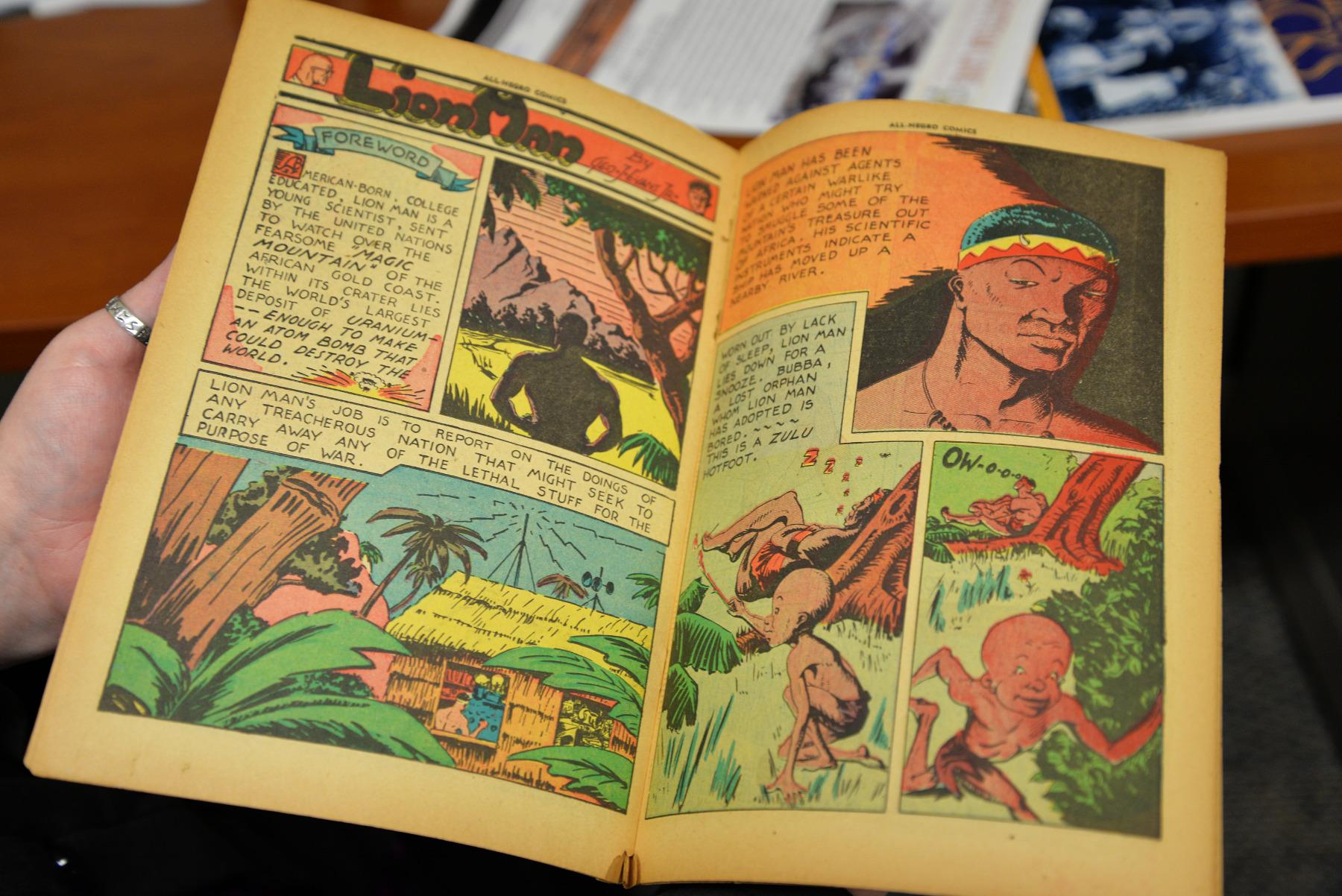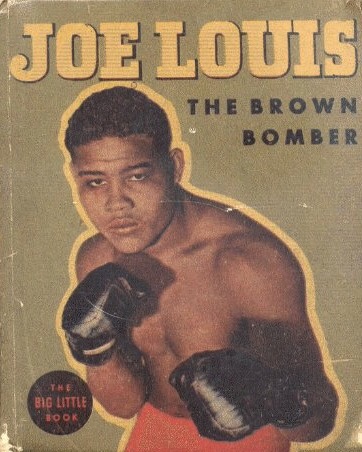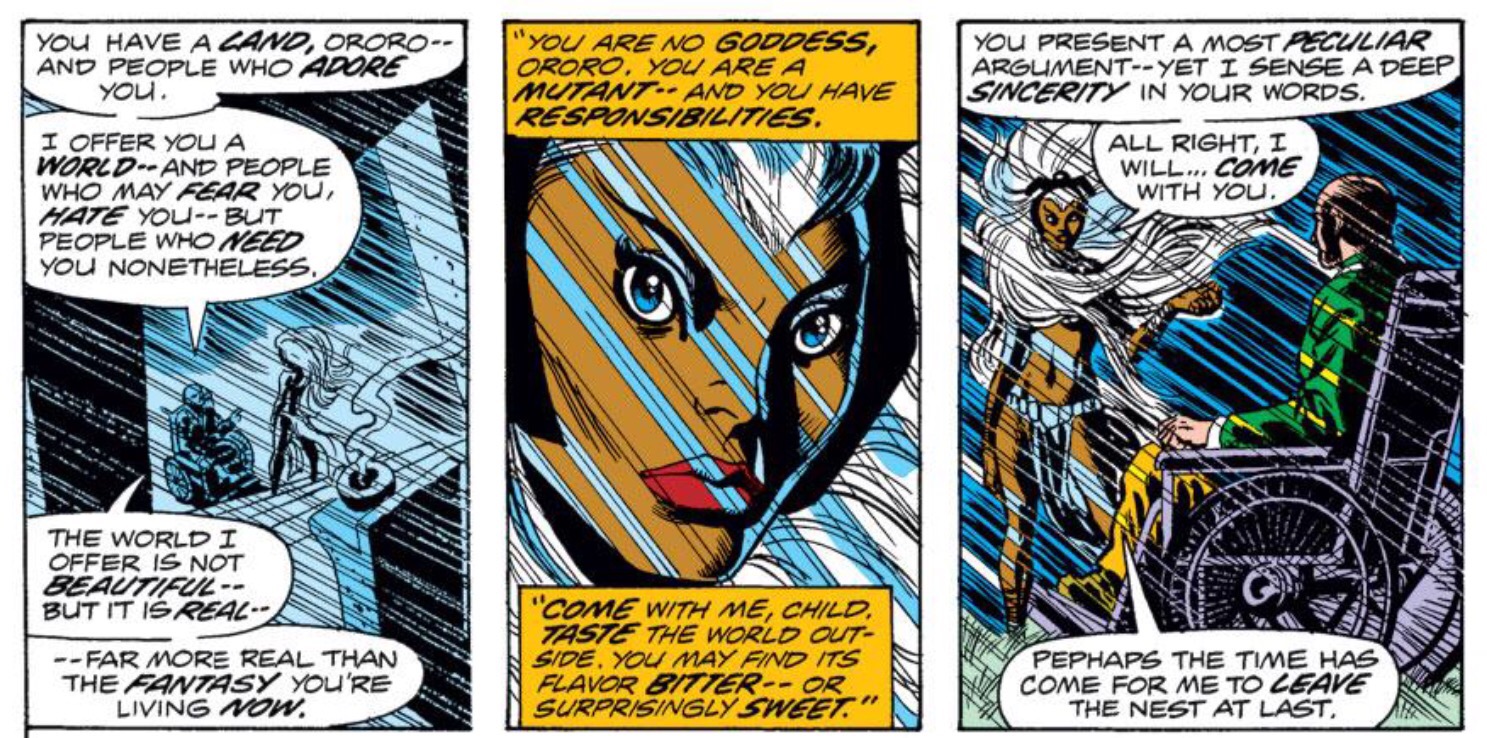The amazing adventures of race in comics
From characters to creators, diversity in comics is on the rise—and you can trace its history right here in town!

Photo courtesy of VCU
Virginia Commonwealth University recently made headlines when it announced the library had acquired a copy of All-Negro Comics No. 1, an incredibly rare and historically significant comic. Published in June 1947 by former Philadelphia Record reporter Orrin C. Evans, All-Negro Comics was the first comic conceived and created solely by African American creators.
The acquisition of All-Negro Comics No. 1 has come at a fascinating time. Mainstream popular culture has recently seen an explosion of interest in both Black comic characters and creators: Marvel’s Black Panther will headline his own movie in 2018, and in Philadelphia, Ariell R. Johnson has recently become the first black woman to open a comic book shop on the East Coast.
You can feel the interest growing in the Richmond comics community also. Local black comic creators Richie Pope, Chris Visions, Chris Kindred, and Shannon Wright have all received national attention for their work. However, Black comics creators are not purely a recent phenomenon–black people and other individuals of color have been involved with comics from the beginning.

Krazy Kat, 1917
Though tracing the earliest involvement of African Americans in comic creation is somewhat difficult, VCU Special Collections has many noteworthy examples of the contributions of Black comics creators from George Herriman‘s Krazy Kat (1913 – 1944) to emerging artists like Whit Taylor. The VCU Comics Collection is heaven for any comic book fan. Now located on the fourth floor of the recently remodeled James Branch Cabell Library, the collection began in the 1970s from a small donation. It’s since steadily grown, now containing about 175,000 items, including about 125,000 comic books, and is now known for showcasing particularly diverse examples of comics and comics-related art. Additionally, VCU Libraries has been the repository for the Will Eisner Comic Industry Awards archives since 2005.
With the enormous amount of comics and other materials contained within the collection, it’s good to have a guide, and there’s no better one than Cindy Jackson, VCU’s Library Specialist for Comic Arts. Jackson has worked with the collection for more than 20 years, first as a work-study student, then later as a staff member who meets with students working on research papers and lectures about the collection.
Talking to Jackson is like taking a graduate-level course on graphic narrative. She’s a force of nature, an inexhaustible source of comics-related knowledge, and impossible to stump. Her office is a comic nerd’s dream, full of recent donations to be catalogued as well as items from Jackson’s personal collection of Batman-related memorabilia. When asked what the single weirdest item found in the collection is, she points to a jar of Superman peanut butter and mentions that they also have a set of Superman sheets. However, the collection is more than a repository of superhero-branded knick-knacks–Jackson emphasizes its commitment to showcasing diversity.
“It is important to have diverse comics simply because the world is diverse,” Jackson said. “People want to see themselves in the things they read and watch. It’s also important for a research collection like ours to preserve these important comics from the biggies like All Negro Comics No. 1 to self-published mini-comics for future students to be able to use for study.”
All Negro Comics No. 1 comic is notable for its relatively positive portrayal of African-American characters that did not rely on racist stereotype or caricature. A 48-page anthology comic, it contains adventure and humor stories, featuring black protagonists such as detective Ace Harlem.
In 2014, Orrin C. Evans was posthumously inducted into the prestigious Will Eisner Award Hall of Fame for his work on the comic anthology, which, unfortunately, never saw a second issue.

Beyond All-Negro Comics No. 1, VCU’s comic collection contains many other significant examples of African American representation in comic art. Look for several Big Little Books, including one featuring boxer Joe Louis. First introduced in the 1930s, Big Little Books were thick and compact illustrated books that usually contained the adventures of a popular character. The Joe Louis edition is a rare example of a nonfiction Big Little Book–Louis held the world heavyweight championship from 1937 to 1949 and is considered to be one of the greatest heavyweights of all time. More scandalous is the collection’s Joe Louis Tijuana bible–one in a series of small underground, pornographic comics produced from the 1920s to the 1960s.
VCU’s comic collection has an extensive set of materials related to black superheroes, including comics from the Luke Cage, Hero for Hire series. Luke Cage, with his unbreakable skin and superhuman strength, was recently featured on Netflix’s live-action Jessica Jones and will headline his own series later this year.

The collection also has a copy of Giant-Size X-Men #1 notable for featuring the introduction of Storm. An X-Men fan favorite, Storm is widely considered to be the first black female superhero. In her original incarnation, her sexy yet powerful look is noticeably similar to the black female action heroes of the time such as those played by actress Pam Grier.
While All-Negro Comics No. 1 was the first comic book with black creators, it was certainly not the last. Founded in 1993 by a group of African-American artists and writers, Milestone Media was formed to help combat the underrepresentation of people of color in comics. The Milestone Comics, which were published and distributed via DC Comics, featured characters like Curtis “Curt” Metcalf, a genius inventor who, in his Hardware identity, uses a variety of high-tech gadgets to fight organized crime. There’s also high school student Virgil Ovid Hawkins, who gains a variety of electromagnetic powers and becomes costumed crusader Static Shock. After the closing of Milestone in 1997, Static was incorporated into the DC Universe and became a member of the Teen Titans. Static is also fondly remembered for having an animated series with one of the best opening credits of all time.
What ever happened to Lil Romeo? Did he stop being lil?
Local comics creator Ronnie Sidney II is also actively working on creating diverse stories. His graphic narrative Nelson Beats the Odds, tells the story of a black middle school student dealing with learning disabilities.
“When I wrote Nelson Beats The Odds, I wanted Nelson to be a hero, but not in the traditional way. He doesn’t have muscles, wears glasses, and is diagnosed with a learning disability,” Sidney said. “An unlikely hero, right? But my purpose was to drive home the fact that ordinary people can do extraordinary things. I wanted kids, particularly those of color, to see their images and experiences represented in a graphic novel format.”
The art of comic criticism has begun to reach maturity, and we’re now able to read quality coverage of Black comic creators. Websites such as Black Nerd Problems and The Nerds of Color engage in cultural criticism from a diverse perspective, and scholarship on black comics is thriving. Both published last year, The Blacker the Ink: Constructions of Black Identity in Comics, edited by Frances Gateward and Black Comics: Politics of Race and Representation, edited by Sheena C. Howard, represent two significant examples.
Having diverse representation in comics is good for the genre as a whole. VCU student, writer, and comic book fan Brittany Maddox points out that comics need to be diverse in order to thrive.
“It is important to have a comics collection that is diverse because the genre itself is diverse,” Maddox. “We are often shown the caped superheroes in the discussions of comics, often white males, who can seem exclusionary to new readers. By having diverse collections, you can then gain new readers, potential creators, and critics.”
— ∮∮∮ —
Visit the VCU Comic Arts Collection online, but really you should just make an appointment to go yourself. Contact Cindy Jackson at hcjackson2@vcu.edu or 804.827.5372.
-
Recommend this
on Facebook -

Report an error
-

Subscribe to our
Weekly Digest





There are no reader comments. Add yours.